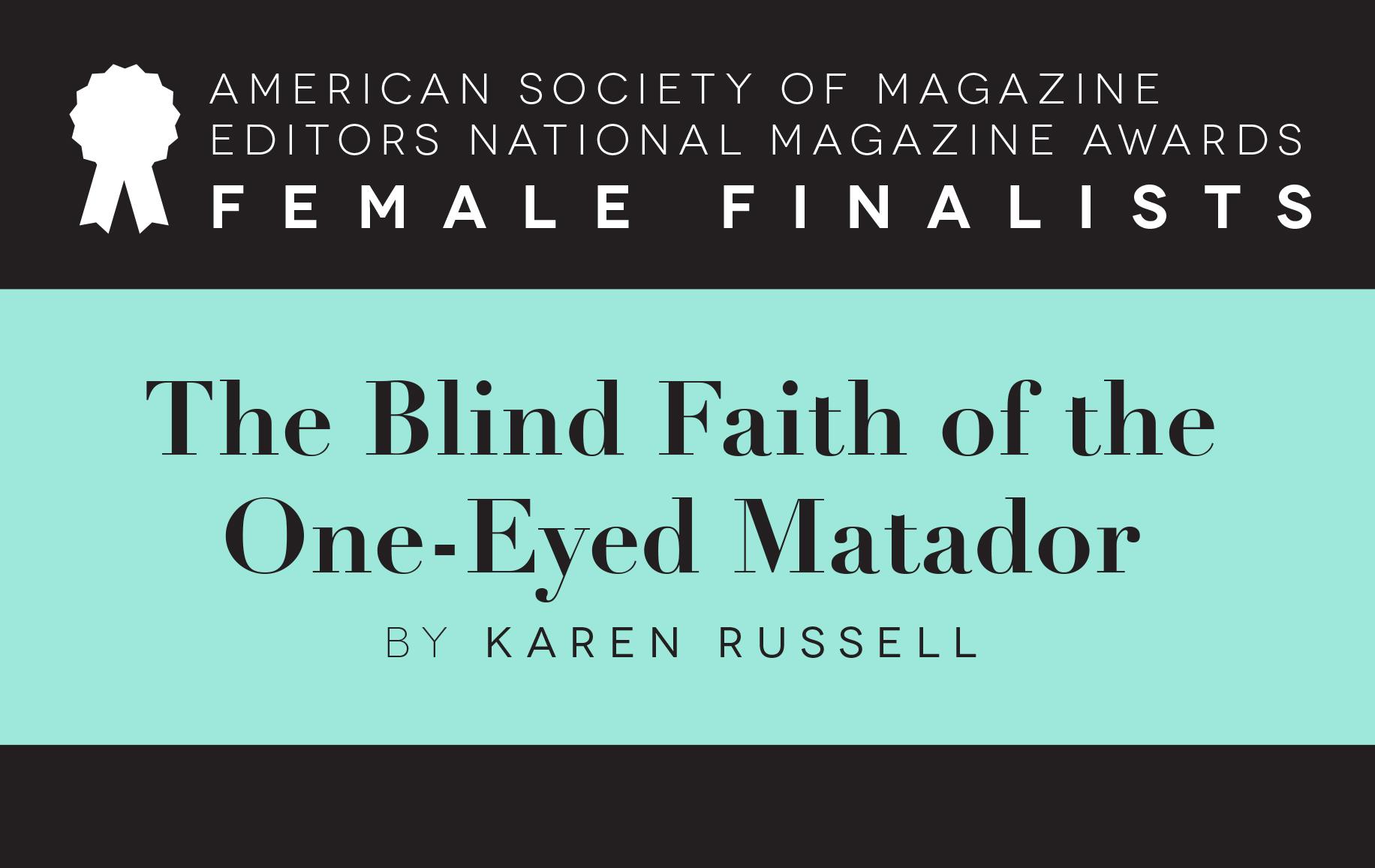Part I of a series of commentary by The Riveter
In her fiction, Karen Russell has been known to compose pictures of eccentricity and spectacle. Take, for example, the first scene of her 2011 New York Times Best Book of the Year Swamplandia! She describes a scene of our protagonist’s Gator Wrestler mother poised above a tank of alligators, ready to perform. For someone, say, like me, who has never been to Florida or anywhere deemed swamp-heavy, this opening scene seems like a relic of brilliant imagination. And it is brilliantly juxtaposed with relatable anecdotes, like the descriptions of sweaty tourists hungry for a bizarre show – “couples curled their pale legs together like eels, beer spilled, and kids wept.”
Yep. I see that. But Swamplandia! is fiction, right? So play with metaphor, Karen Russell. Play with prose. Play with reality, and take your audience somewhere familiarly new.
Now imagine her position as a journalist. She is in Spain watching a seasoned matador re-train after a great fall. She is invited to his home before his epic public return to bullfighting after losing an eye to a bull’s horn five months before. She has a translator. She anticipates “whimsical yet terrifying” Spanish bullfighting words. Like torero (an all-encompassing term for any bullfighter). Like toros bravos (the bull). Like cojones (balls.) She describes the practice hay bale as a “cheese cube at the end of a gigantic toothpick.”
This is a real eccentric spectacle.
For her first GQ feature, she writes just like she’s writing fiction – metaphors, longwinded but interesting descriptions – and it works. Well, of course it works; thus, her nomination for an ASME feature writing award.
And can I just say – reading a story about a man published in a men’s magazine that seeks to answer the question, What is the valor of man? is something I often find myself doing, not because of my own choosing, but because they are everywhere. Like Wright Thompson’s “Michael Jordan Has Not Left the Building,” or James Bennet’s “The Bloomberg Way,” or Michael Finkel’s 2012 ASME profile finalist “The Blind Man Who Taught Himself To See,” or, since I’m on the topic, Michael Paterniti’s 2012 ASME feature writing finalist “The Man Who Sailed His House,” or David Grann’s 2011 ASME feature writing finalist “The Mark of a Masterpiece,” or Mark Seal’s 2010 ASME profile finalist “The Man in the Rockefeller Suit,” or Chris Jones’s 2009 feature writing winner “The Things That Carried Him.”
To read a story about a man published in a men’s magazine that seeks to answer the question, What is the valor of man? written by a woman is sort of like the relief after a long battle with hiccups. The story is fascinating and foreign and educational and strange and masculine, and I’m not sure how a man would have written about it, but I am sure that Karen Russell’s voice is honest and uniquely descriptive, and she boldly tells Padilla’s tale.
She decorates the stage for what happened like this: “Padilla is luminously scaled in fuchsia and gold, his ‘suit of lights.’ He lifts his arms high above his head, like a viper preparing to strike.” She describes the horror of the accident like this: “As the blood gushes down his cheek, he holds his dislodged eye in place with his pinkie. He thinks he must be dying.” She becomes him like this, with italics: “I can’t breathe. I can’t see.” She admits herself into the story like this: “It’s a crazy, horrible, ugly, enraging, senseless, sublime, endless moment to witness – a moment that swallows every adjective you want to hurl at it.”
I don’t know how a man would have written this – perhaps I could be unoriginal and suggest that a man’s pen may have been less forgiving, he may not have felt it was necessary to suggest the bullfight is a “crazy, horrible, ugly” moment, or he may not have admitted to feeling fear for the matador like Karen does. But Karen’s pen makes these elements of the story permanent, and because of them, I am able to feel for Juan Jose Padilla, the determined matador, and I am able to somehow grasp this foreign, unknown, eccentric world.
The relief of reading Karen Russell’s piece really is like post-hiccup solace. It feels almost temporary. And in the meantime, I’m wondering: Where are all the pieces that answer the question, What is the valor of woman?




